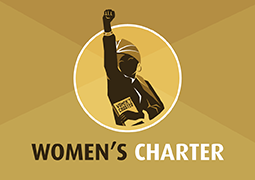
Venue: Alberton Civic Centre Date: 10 June 2022 Time: 09h00
Premier of Gauteng
Speaker of Gauteng
Members of Parliament and the Provincial Legislature
Provincial Executive Members of Gauteng
District Mayors
Leaders of Chapter Nine
Ladies and Gentlemen
Programme Director, allow me to state at the beginning that I truly appreciate the opportunity to speak on the occasion of the report back session of the Women’s Charter for Accelerated Development.
In an effort to enable the institutionalisation of gender sensitive-good governance norms and practices, Parliament has successfully completed its nation-wide, 25-year review of the 1994 Women’s Charter for Effective Equality.
The review process was undertaken in collaboration with strategic partners and stakeholders across the three spheres of government. The review process of the Women’s Charter for Effective Equality was initiated by a resolution of the inaugural women’s Parliament of the sixth dispensation.
The review engagements have explicitly exposed the glaring gap between policy and practice and the disjuncture between public endorsement of gender equality and actual institutional practice.
The review process has also exposed how institutions charged with the responsibility to advance gender mainstreaming are no longer appropriately designed, capacitated and managed.
Most of our state institutions suffer from the displacement of technical competences in the core business and the management of its operations.
Honourable Members, through the country wide-provincial, metro and district level engagements, Parliament was able to gather valuable information and findings, which have become the basis upon which, sustained engagements with provinces, metros and districts will now continue to be based on. Particularly for the advancement of gender equality, through the various oversight mechanisms.
The newly developed Women’s Charter for Accelerated Development, which encompasses 15 strategic objectives and a set of broad priority actions, appropriately encompasses the invaluable inputs received from all sectors of society for accelerated implementation by all sectors of society.
Adherence to the precepts, strategic objectives and priority action of the Charter, will require a social compact and a resolute commitment to re-engineer systemic and institutional arrangement across the three spheres of government.
If the state machinery fails to effectively respond to the cyclical and generational nature of the prevailing challenges faced by women, the disproportionate impact of multi-dimensional poverty, economic exclusion, Gender-Based Violence and Femicide, will continue to impede tangible advancements to realise substantive equality.
The Women’s Charter for Accelerated Development serves as the Demand Document for the Women of South Africa, articulating matters for urgent prioritization by the three Arms of the state, the three spheres of government, including all Sectors of Society. The revised charter will also serve as a road map for effective policy re-design going forward.
Distinguished Guests, Parliament is embarking on a process of tracking progress made in implementing the undertakings made by Gauteng High-Level Session, where the Provincial Executive proceeded to present, a comprehensive gender mainstreaming programme of action for the province.
Covid-19 and Gender Transformation
The COVID-19 pandemic offers the South African government an opportunity to overcome its state weaknesses and to put gender transformation in the centre of planning and budgeting, replenish the capacities of the state, and implement the social and economic changes that were planned, but never brought to fruition.
This requires a clear sense of purpose that defines a compelling narrative for transformative change, and the necessary institutional capacities and capabilities that can deliver such change. South Africa has a rare opportunity in the context of the COVID-19 pandemic and the economic crisis that this has triggered to do everything possible to drive major economic change across the various levels in government, as well as in its SOEs and other delivery agencies.
The government has an opportunity to ‘build back’ based on a new mission centring on greater economic inclusion; overcoming the spatial legacy of apartheid; delivering social and economic infrastructure to both improve the quality of government services and enable new economic activities, including those aimed at generating green growth to thrive; building institutional capacities for the public sector and skills for the economy; promoting small and medium enterprises; and accelerating digital transformation in a gendered approach.
We are meeting here, to demand that Poverty Mapping Perspective in Gender Responsive Planning and Budgeting be institutionalised as an imperative for planning in order to ensure that the needs of women across varied incomes are effectively considered.
Honourable Members, South Africa’s economic development policy must secure a central place for women in the economy and our priorities must be focused at the given policy imperatives of the NDP towards a revised gender sensitive NDP, as South Africa overarching development nexus, with a particular focus on the inclusive growth priorities of the NDP and its gendered implications.
Honourable Members, we hereby welcome you and hope we will have frank and honest discussions, in order to accelerate the momentum towards gender mainstreaming and gender equality. In order to accelerate this work, we will need to work in a cohesive manner, and cooperative manner through building strong social compacts
Thank you

